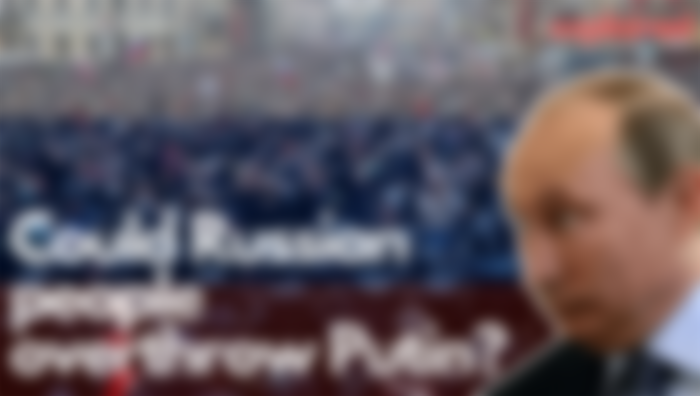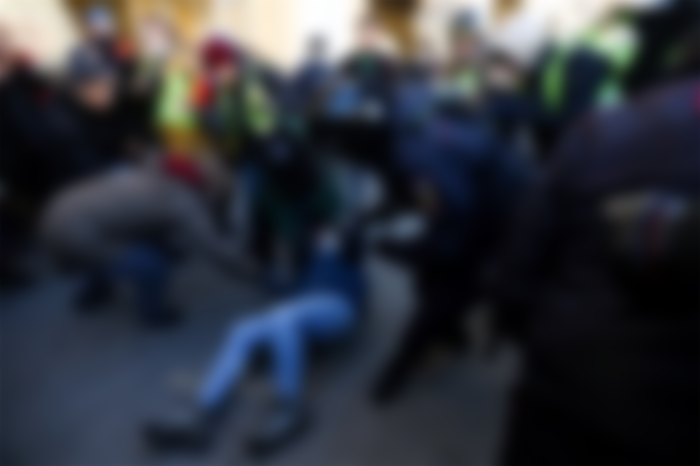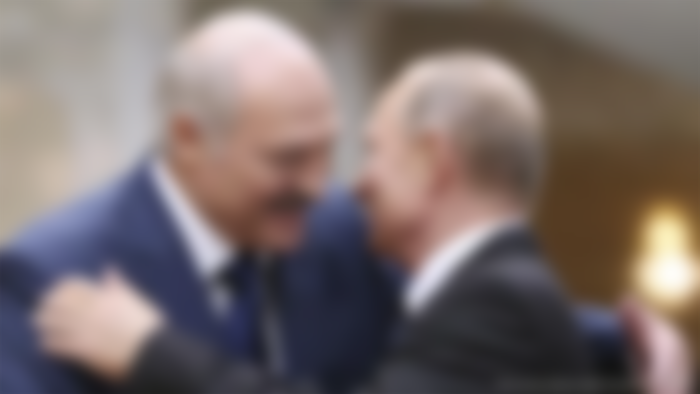Explained: Could Russian people overthrow Putin?

Imagine you are a citizen of an autocratic country. Your troops have just invaded your neighbor. You were promised a fast invasion and that your soldiers would be greeted as liberators. But the neighboring country fought back, and now the casualties are going in the thousands. At home, your economy basically vanished overnight. Everyone is running to the banks to withdraw all the money they can, but the banks don’t have any money left to give. You would like to start a mass rebellion to throw your autocratic leader out of power. Will that work out?
The answer is that such uprisings are simultaneously easy but also unlikely. That is the paradox of autocratic rule. You see, even in the most repressive of countries, the general public vastly outnumbers security forces. If everyone shows up to protest at the same time, it is no longer in the security forces’ best interest to repress the protestors. Not if they want to live anyway. The problem for protestors is that safety only comes in numbers If just a few people show to the street corner, they are no match for the security forces. Even in an optimistic scenario, they can expect to spend some time in jail.
As such, the interesting game of protests is not between protestors and security forces it is between protestors and other protestors. I, as a would-be protestor, need to anticipate what everyone else is doing. If I expect everyone else is going to protest, then I wouldn’t want to miss it. But if I anticipate that very few people will be there, then I also don’t want to show up. Regime-ending protests are therefore a self-fulfilling prophecy.

If Alexander thinks that Yulia is going to show up, that makes Alexander more inclined to show up. And now that Alexander is more inclined to show up, Yulia’s original inclination to show up has been reinforced. Their collective plan to show up encourages Natalya to show up, which reinforces Alexander’s and Yulia’s initial decision again. Now the three of them provide motivation for the fourth person to show up, which further validates their desire to do so. This process repeats as many times as you want. Eventually, we now have a large enough group to flood the streets, overwhelm security forces, and remove the autocrat.
Unfortunately, the self-fulfilling prophecy also goes the other way. A vicious rumor that Oleg isn’t planning to protest can persuade Misha that it is too risky to show up, even if that rumor was completely false. But now Misha’s gone.And that might be enough to remove Oleg as well. And now that Polina thinks Misha and Oleg are not going to be there, she also chooses not to protest.Suddenly, the safety in numbers disappears, and no one protests at all.In game theory, we describe this issue as a problem with multiple equilibria. More specifically, this is basically what’s called a stag hunt with many playersbut that’s a article for another time.

The issue here is that we have two equally plausible self-reinforcing prophecies. It all depends on what people think will happen initially. On most days in an autocratic/dictatorial regimes, people don’t expect protests. And that’s self-reinforcing.If no one expects there to be a protest, then no one has an incentive to create one by themselves.This is why mass protests are hard to predict. Something can just little spark coordination, and suddenly the whole government is gone.
For example During the Arab Spring, one man’s self-immolation coordinated protests in Tunisia, which helped coordinate protests in Algeria, which helped coordinate protests in Jordan, which helped coordinate protests in Oman, which helped coordinate protests in Egypt, which helped coordinate protests in Syria, which helped coordinate protests in Libya.

countries that affected from arab spring, wikipedia
It also means that coordination can arise for some rather silly reasons. This man is Gunter Schabowski. He was the de facto number two in the East German government in 1989. He also started doing these weird things known as “press conferences” because the government was liberalizing.
Earlier on the day of this press conference, Egon Krenz, the leader of East Germany, had written new, liberal rules for crossing into West Germany. Schabowski was absent from that discussion. As a result, he missed some important details. The new regulations were supposed to go into effect the next day. Instead, Krenz handed Schabowski a note with a brief explanation of the rules. That takes us back to the press conference.

Schabowski read from the note. A reporter asked when the reforms would start.With the note not giving that information, Schabowski responded “As far as I know, effective immediately without delay.” What Schabowski didn’t realize is that he had just coordinated everyone to go to the Wall at the same time. Border guards were not prepared for this. They relented, the Wall opened, and the Iron Curtain fell

fall of berlin wall
This is why autocratic governments exert so much effort to control the media: it’s the easiest way for protesters to coordinate. It’s also why China cares more about censoring socialmedia posts about collective action than it does about direct criticism of the communist party itself.
Today, Putin is trying to control the narrative and limit demonstrations. This is part of why the west has imposed economic sanctions against Russia. The more straight-forward aspect of sanctions is that it makes the status quolook less favorable to average Russian citizens, which makes taking the risk to protest look less unattractive than it did before. More subtly, sanctions create focal points for protests. As more businesses shut down, citizens have more excuses to coordinate, aside from their greater desire to do so. But there is an important thing working against a potential protest in Russia.
Putin has basically nowhere to go. As the Euromaidan crisis started in 2014, President Viktor Yanukovych had a choice: send in security forces to eliminate the protestors or flee the country. The first option was risky. If it failed, he could anticipate going to jail or worse. So he took the safe option, heading to exile in Russia. Putin does not have that luxury. The only feasible exit options are Belarus, a very weak country, or China, which probably doesn’t have much interest in him.

Belarus president Lukashenko and putin, DW
Ironically, this vulnerability can make Putin’s position stronger. Potential protestors can almost guarantee that they will face some resistance to overthrowing the government.That makes protesting more dangerous, which makes the marginal person less inclined to do it. But that makes the next person less inclined to do it, which makes the next person less inclined to do it, and so forth. Put simply: a popular protest to overthrow Putin is not going to be a walk in the park






